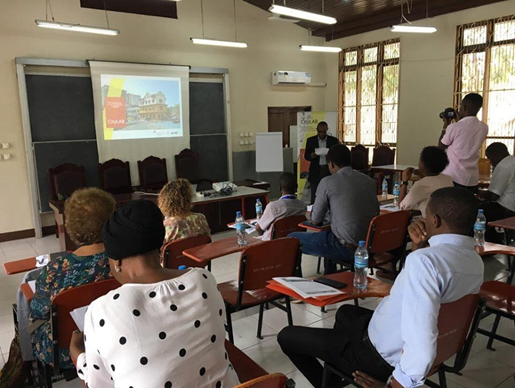“Preserving Behavioral Diversity: Challenges for Conservation in the 21st Century”
Lecture by Professor Patricia Izar, Department of Experimental Psychology, University of São Paulo - USP
By Yoktan Nyondwi and Priscila Izar
The CityLAB welcomed Professor Patricia Izar on September 10, 2019, for her lecture “Preserving Behavioral Diversity: Challenges for Conservation in the 21st Century.” Professor Izar presented findings from her studies on Capuchin monkeys in different research sites in Atlantic Forest and in Cerrado/ Caatinga biomes in Brazil for over two decades, working together with interdisciplinary teams of Brazilian as well as international researchers. Her goal was to “discuss the paradox that species’ adaptability to environmental change can happen at the cost of cultural diversity loss, posing a new threat to conservation planning and action.”
During her lecture, Professor Izar spoke about the behavioral adaptability of the Capuchin monkeys to environmental changes, and how a great capacity to adapt can sometimes pose a threat to the survival of some species. For example, she showed examples of primates that enter human settlements in search of food, or that learn to take crops from plantations. These primates adopt such behavior as a survival skill facing the lack of food that results from the clearing of forested areas by humans. However, such behavior also threatens their survival as humans do not appreciate the disturbance and loss to their environments that these primates can bring.
IHSS Director, Dr. Makarius Mdemu introduces Professor Patricia Izar before her public lecture at the DMTC Hall at Ardhi University
Professor Izar’s main argument was that the loss of species’ diversity leads to the loss of cultural diversity. Right now, she explained, we have to “run against time” to learn as much as possible from non-human primates, as their environments, their cultures and their survival is under threat from deforestation and other types of environmental degradation. She also spoke of the differences in behavior of the capuchin monkeys she has been studying, based on the environment where they live. For example, the group that she and her research team studies in Parque Estadual Carlos Botelho, in the state of São Paulo, Southeast Brazil, deals with food scarcity and has a very complex network of routes that they use to search for food. In contrast, another group that she studies in Fazenda Boa Vista, in the state of Piauí, in Northeast Brazil, faces less food scarcity and has a simpler network of routes. Professor Izar also explained how behavior is transferred from the older to the younger members of a group, through social learning. She found that out by observing the capuchin monkeys in Fazenda Boa Vista using stones to break nuts. The older capuchin monkeys transfer this intricate knowledge to the youngsters, from posture, to speed, to type of stone
Professor Izar talks about social amongst the capuchin monkeys of Fazenda Boa Vista in Northeast Brazil
While working in the field of natural sciences, and with methodological tools that are different than those usually used in urban research, the concerns that Professor Izar presented about the future of the environments and the populations that she studies reasons with the concerns that other scholars presented in their lectures discussing the future of cities and regions, during the CityLab Public Lecture Series. Similar to how Professor Alan Mabin addressed the context where urban transformation is currently happening, Professor Izar spoke of “challenging times.”
Another interesting aspect of her lecture is that it illustrated knowledge co-production in a different discipline. Overall, it was a fascinating discussion that revealed many common interests between the fields of urban development and ecological conservation.


